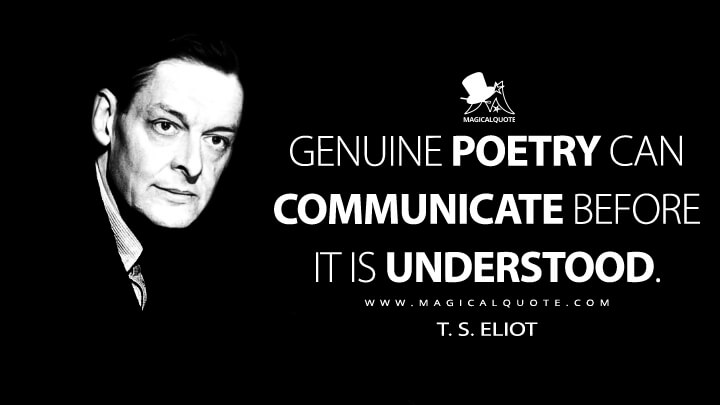Tradition
and Historical Sense
In the
essay "Tradition and the Individual Talent" Eliot explains his notion
of tradition. Tradition is not the blind devotion towards previous generations,
neither imitation nor mere repetition. Tradition can be attained through
historical sense. Historical sense is a perception that past has a purpose in the
present. According to Eliot: "the historical sense involves a perception,
not only the pastness of the past, but of its presence [...] this historical
sense, which is a sense of the timeless and of the temporal, is what makes a
writer traditional." Eliot continues to say that this historical sense of
tradition makes a writer conscious of his/her place in history, his
contemporaneity. Historical sense helps the writer to become aware of the
continuity of literature where he/ she realizes his/her position among others
from Homer to his contemporaries, which helps to "form a continuous
literary tradition". No poet has an independent meaning or significance of
his/her own. The past writers are significant in the present. This comparison
is made for the purpose of analysis and it is reciprocal. Past helps us to
understand the present and the present throws light on the past. Tradition to
Eliot is the classics and other great literature of the past like the
metaphysical poetry. This historical sense helps a writer to escape his
personality.
Impersonality
theory of poetry
Eliot
rejected the romantic theory that poetry is an expression of artist's
personality, Poetry is an experience which has a value beyond the poet.
"The progress of an artist is a continual self-sacrifice, a continual
extinction of personality". asserts Eliot. His impersonal theory of poetry
has two aspects. Firstly, all poetry that has ever written is a continuum(a
sequence), a living whole, despite the fact they are written by different poets.
Second one is the special relationship of a poem to its author. Eliot states in
his "Tradition and Individual Talent": "The poet has no
personality to express,
but a particular medium, which is only a medium and not a personality, in which
impressions and experiences combine in peculiar unexpected ways."
Like an empiricist which he was, Eliot
evokes the image of a catalyst in a chemical reaction. According to Eliot, the
degree of impersonality in poetic creation will be greater with the greater
artists. He states; "the more perfect the artist, the more completely
separate in him will be the man who suffers and the mind which creates."
This impersonality can be achieved only when the poet acquires a sense of
tradition and the historic sense which make him conscious of the present and
past.
Objective
Correlative
The term
first used by American painter Washington Allston in 19century, was revived
famously by Eliot in his famous essay on "Hamlet and his Problems"
(1919) to designate a concept which later became a major concern of the 20
century literary criticism. According to Eliot, since the poet cannot transfer
his emotions or ideas directly to the readers, there should be a mediation to
evoke the same. In his own words, "the only way of expressing emotion in
the form of art is by finding an 'objective correlative', in our other words, a
set of objects, a situation, a chain of events which shall be the formula of
that particular emotion." In short, objective correlative is a situation
or event designed by the poet which symbolizes or objectifies a particular
emotion to evoke the same emotion in the reader. Objective correlative can be
called as a medium through which the transaction between author and reader
inevitably takes place. The reader responds to the object or medium and through
that, to the poem. A famous. exemplification presented by Eliot is from
Macbeth. In 'the sleep walking scene', Shakespeare uses the act of unconscious
recollection of the horrific crime by Lady Macbeth as a correlative to convey
the mental agony to the spectators objectively. A great work of art, according
to Eliot, is a set of conceptual symbols or correlatives which attempt to
express the emotions of the poet. He also remarks in the essay that Hamlet is
an artistic failure as Shakespeare failed to constitute the objective
correlative.
Dissociation
of Sensibility
It refers
to the way in which the intellectual thought was separated from the experience
of feeling in the seventeenth century poets like Milton and Dryden.
Eliot put
forward the idea of 'dissociation of sensibility in his essay "The
Metaphysical Poets"(1921). He makes the idea clear in the following words:
The poets
of the seventeenth century, the successors of the dramatists of the sixteenth,
possessed a mechanism of sensibility which could devour any kind of experience.
They are simple, artificial, difficult, or fantastic, as their predecessors
were; no less nor more than Dante, Guido or Cino. In the seventeenth
century a dissociation of sensibility set in, from which we have never
recovered, and this dissociation, as is natural, was aggravated by the
influence of the two most powerful poets of the century, Milton and
Dryden."
Good
poetry represents 'unification of sensibility, Eliot insisted. Thoughts are
transformed to feelings. Then poetry is transfused by a union of the two which
is poetic sensibility. But when the poet is unable to convert his thoughts to
feelings, the result is 'dissociation of sensibility, the split between
thoughts and feelings. Eliot says that this happened with the poets of late 17
century like Tennyson and (17 Browning. They think, but they could not feel their
thoughts "as immediately as the odour of a rose" There is a clear
disjuncture between thoughts and feelings. But this was not the case with the
metaphysical poets. In them we could witness a unification of thought and
experience Eliot compares the metaphysical poets like Donne, Marvell and Cowley
with later poets like Gray, Goldsmith and Johnson and found that the former
group of poets possesses finer sensibility.

No comments:
Post a Comment
looking forward your feedbacks in the comment box.